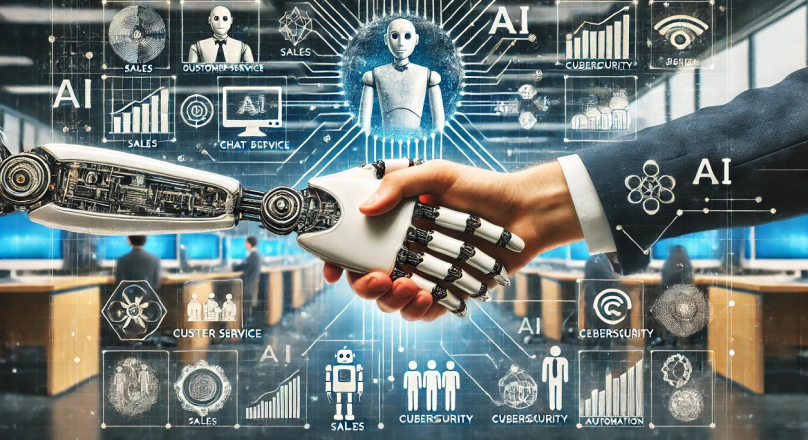Artificial Intelligence (AI) is no longer just a futuristic concept—it’s a fundamental part of today’s business landscape. From customer service automation to data-driven decision-making, AI is reshaping how companies operate, compete, and grow. As businesses continue to seek innovative solutions to improve efficiency and stay ahead of the curve, AI has emerged as a powerful tool that is transforming nearly every aspect of operations.
Understanding Artificial Intelligence in Business
Artificial Intelligence refers to machines or software that can perform tasks typically requiring human intelligence. These tasks include learning from data, recognizing patterns, understanding natural language, and making decisions. In business, AI encompasses a range of technologies including machine learning, natural language processing (NLP), robotics, and computer vision.
Rather than replacing humans altogether, AI is most effective when it augments human capabilities—automating routine tasks, analyzing complex data at scale, and enabling employees to focus on more strategic initiatives.
Key Areas Where AI Is Transforming Business Operations
1. Customer Service and Support
One of the most visible applications of AI is in customer service. Chatbots and virtual assistants powered by NLP can handle common customer inquiries 24/7, significantly reducing wait times and operational costs. These systems can answer questions, provide recommendations, and even process orders, creating a seamless customer experience.
Advanced AI tools can also analyze customer sentiment and behavior, helping companies personalize support and proactively address issues before they escalate.
2. Data Analysis and Decision-Making
AI excels at sifting through vast amounts of data quickly and accurately. Businesses can leverage AI-powered analytics to identify trends, uncover insights, and make data-driven decisions in real time. For example, marketing teams use AI to analyze consumer behavior and optimize campaigns, while finance departments rely on predictive analytics to manage risk and forecast performance.
Machine learning algorithms improve over time, learning from new data to make increasingly accurate predictions—whether it’s anticipating market shifts or identifying supply chain disruptions before they occur.
3. Operations and Process Automation
AI is revolutionizing business operations by automating repetitive and time-consuming tasks. Robotic Process Automation (RPA) allows companies to streamline workflows such as invoice processing, payroll management, and compliance tracking. This reduces human error, improves speed, and allows employees to focus on higher-value work.
In manufacturing, AI-driven robots are used for precision tasks, quality control, and real-time production monitoring. In logistics, AI helps optimize delivery routes, predict demand, and manage inventory more efficiently.
4. Human Resources and Talent Management
AI is playing a growing role in hiring and employee engagement. Recruitment platforms use AI to scan resumes, match candidates with job descriptions, and reduce bias in the selection process. AI-powered tools can also assess employee performance, predict turnover, and suggest personalized learning paths to foster professional development.
By automating administrative tasks like scheduling and benefits management, AI frees HR professionals to focus on strategic initiatives like culture-building and workforce planning.
5. Sales and Marketing Optimization
AI has become a game-changer in sales and marketing. Tools like CRM (Customer Relationship Management) systems powered by AI can score leads, recommend sales actions, and even automate follow-ups. Personalization engines analyze user behavior to deliver targeted content, improving engagement and conversion rates.
In e-commerce, AI helps recommend products based on previous purchases or browsing history, creating a more tailored shopping experience.
Benefits of Integrating AI in Business
- Increased Efficiency: Automating routine tasks leads to faster operations and reduced human error.
- Cost Savings: AI can reduce operational costs by minimizing manual labor and optimizing processes.
- Scalability: AI systems can handle growing volumes of data and interactions without requiring proportional increases in human resources.
- Improved Customer Experience: AI enables faster, personalized, and more consistent service.
- Enhanced Decision-Making: Real-time analytics and predictive modeling provide businesses with actionable insights.
Challenges and Considerations
Despite its many benefits, AI adoption also presents challenges:
- Data Privacy and Security: AI systems require large datasets, raising concerns about how data is collected, stored, and protected.
- Job Displacement: While AI creates new roles, it may also automate certain jobs, necessitating workforce reskilling.
- Implementation Costs: The initial investment in AI technology and infrastructure can be significant, especially for small businesses.
- Bias and Fairness: AI models can inadvertently inherit bias from training data, leading to unfair outcomes unless carefully managed.
To overcome these challenges, businesses must adopt a responsible AI strategy—prioritizing transparency, ethics, and ongoing human oversight.
The Future of AI in Business
Looking ahead, AI will continue to evolve and integrate more deeply into business operations. We can expect increased use of generative AI, autonomous decision-making, and AI-as-a-service platforms that allow businesses of all sizes to leverage advanced technologies without building them from scratch.
In a world where adaptability and innovation determine success, embracing AI is no longer optional—it’s essential. Businesses that invest in AI today are positioning themselves to lead in tomorrow’s economy.
Conclusion
Artificial Intelligence is not just a technological trend—it’s a transformative force in modern business. From automating operations to empowering data-driven decisions, AI is helping companies improve productivity, enhance customer experience, and unlock new growth opportunities. As long as it is implemented ethically and strategically, AI has the potential to elevate businesses to unprecedented levels of performance and innovation.






